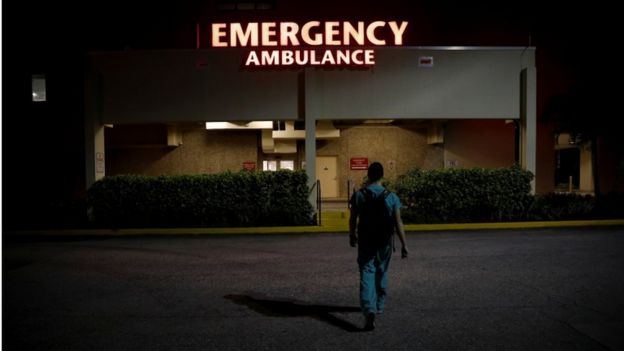Coronavirus: Why so many US nurses are out of work

At a time when medical professionals are putting their lives at risk, tens of thousands of doctors in the United States are taking large pay cuts.
And even as some parts of the US are talking of desperate shortages in nursing staff, elsewhere in the country many nurses are being told to stay at home without pay.
That is because American healthcare companies are looking to cut costs as they struggle to generate revenue during the coronavirus crisis.
“Nurses are being called heroes,” Mariya Buxton says, clearly upset. “But I just really don’t feel like a hero right now because I’m not doing my part.”
Ms Buxton is a paediatric nurse in St Paul, Minnesota, but has been asked to stay at home.
At the unit at which Ms Buxton worked, and at hospitals across most of the country, medical procedures that are not deemed to be urgent have been stopped. That has meant a massive loss of income.

While she has, until now, retained health insurance benefits through the company she worked for, Ms Buxton is not being paid her salary while she is off work.
“People would always say to me, being a nurse you’ll never have to worry about having a job. And here I am, newly 40 years old and unemployed for the first time since I started working,” she says.
Although she is supportive of the measures taken to curb the spread of the virus, Ms Buxton worries that the longer hospitals cannot perform regular medical procedures, the more nurses that will find themselves in the same position as her.
- An invisible wound for health workers and soldiers
- ‘Like 9/11 every day’: A New York paramedic’s diary
And revenue generation for hospitals has not just been affected by bans on elective surgery.
“I was scheduled to work 120 hours for the month of April. But about halfway through March, I looked at the schedule and all of my hours had been cut,” says Dr Shaina Parks.
“I didn’t receive a phone call or an email or anything. They were just gone. It was an extremely uncomfortable feeling,” she says.
 Image copyrightREUTERS
Image copyrightREUTERSDr Parks is a specialist in emergency medicine based in Michigan, but who works at hospitals in Ohio and Oklahoma.
The departments she works at are still open, but patients are not coming in.
“I have been doing some telemedicine this past month to make a little bit of the income that I lost,” says Dr Parks.
“And what I’m hearing from almost every single patient is that they really don’t want to go to hospitals because they’re afraid of the coronavirus.”
That sentiment has left emergency departments across the country far quieter than normal.
“If we’re not seeing patients, then we’re not generating any sort of billable money, and while we’re paid hourly, we also earn money by the number of patients that we see per hour.”
Dr Parks says she has been considering filing for unemployment benefits to try to help make student loan repayments.
While it may seem curious that so many American medical staff are taking pay cuts or have lost work during a pandemic, healthcare managers say the huge financial pressures mean they have had little choice.
“We have seen our revenues decline by 60%, just about overnight,” says Claudio Fort, CEO of a hospital in Vermont that is losing around $8m (£6.4m) a month.
It is why, he says, they have had to furlough around 150 staff, just under 10% of the hospital workforce.
![]()





